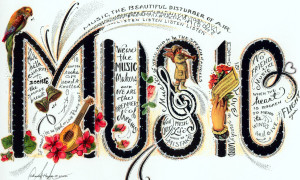Let your mistakes be your light!
One thing I notice both as a musician jamming with others, and as a music tutor, is the fear of mistakes.
While I understand the concern when playing in front of a crowd, there’s NO excuse when one is learning, as the only critic is your 4 walls.
Yet, sometimes when one is learning an instrument, they forget that the best learning of one’s mother tongue happened while still in the cot, with little to no consciousness. Similarly in music, best to think less – to walk the fire, to swim the water, to take risks.
What do I mean?
When we are writing songs, we should just try ideas and see how they sound. Sometimes (or many times) we think too much wanting to know about the theory of why something will sound right. But how about we instead experiment and if it sounds right then it means we are using some theory rule, even if we do not know which? After all, haven’t we all learnt to listen and speak before how to read and write?
Same when practising. We need to try stuff. Take e.g. a solo – some are scared to improvise, others just go for it. Or a strum pattern of a song – some spend ages trying to get all the down and up strokes exactly like a video by the original songwriter, while others do not look up a video at all (remember the pre-YouTube years?), just sing the song’s rhythm, & start strumming it without understanding how it would be written. So who gets on with it first? The 2nd of course!
Which brings me to the next point – efficiency. When you practice, don’t overthink because if something comes out wrong, your ears will let you know, thus learning how not to do it. Great! So try again! Wrong again? Amazing! 2nd lesson learnt in how not to do it. And sooner than you realize, you run out of all the options of how not to do it, that you will do it right! Get the point here? I am from Malta (a Mediterranean island). Do you know how most of us learn how to swim? Our parents throw us into the sea, and that way through learning how not to swim, there is only maybe 10% of the technique of swimming they later have to explain! Efficiency at its best – of course they are in the water with us to ensure we don’t drown, and that’s where lessons with a pro tutor come in – he teaches you how to swim alone, but never lets you drown.
Quick question here!
You to stranger : What’s your name?
Stranger : Lucy
Verbally ask the above – takes 1 second to get an answer.
Now write the question on a paper & hand it to Lucy, and she’ll write her name on the paper, and you read it back. Surely that took longer didn’t it?
It’s the same with your instrument – go for it, and it gives you answers sooner!
This is also what makes the best musicians live, always confident they can turn any mistake into a clarification, like in a face-to-face conversation vs an endless Facebook argument (we’ve all facepalmed at those endless threads).
And now to writing our own songs. Sometimes we are in our element, and writing the best tunes. But other times we are in a different mood – drunk, or tired, or simply not our usual self. But we feel an urge to play, maybe stronger than when we are our normal self. So whatever your mood, don’t overthink, just film/record yourself. Do NOT think of the mistakes you could do, but go for it, and only later, do listen and watch.
For example, my video above! I just was out and about, and needed to express myself so much that once home I just filmed (as you can see I literally placed my mobile on the chair and started). Did I care about the camera angle/ filming quality? NO….. because music is audio not video! So that’s my suggestion to anyone – when your creativity calls do not clutter your head thinking about mistakes/ lack of perfection/ perfect filming/ bla bla bla, but just go for it! You’ll thus build a library of snippets, and only later when writing a song that you extract the best parts of whatever you got.
Till next time, keep making mistakes, as they will be your light!
For vidz accompanying similar articles, please subscribe to Cool Gool’s Youtube
For lessons, please book at this link.)
www.malcolmcallus.com
Modern approaches to guitar, bass, ukulele & music theory tuition






